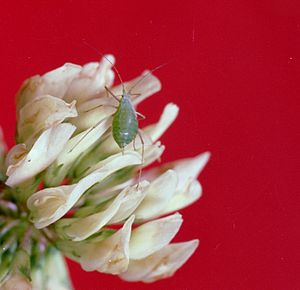 Image via Wikipedia
Image via Wikipedia
A new study finds the aphids are able to detect the breath of animals including humans as they approach a plant allowing them enough time to flee. Researchers at the University of Haifa at Oranim, Israel first noticed this phenomenon when they allowed a goat to feed on aphid-infested alfalfa plants— "Strikingly, 65 percent of the aphids in the colonies dropped to the ground right before they would have been eaten along with the plant," the researchers write.
 Image via Wikipedia
Image via Wikipedia
The researchers later used snorkels to keep their own breath from ruining their experiments.
To read the full ScienceDaily article click HERE.
Journal Reference:
Moshe Gish, Amots Dafni, Moshe Inbar. Mammalian herbivore breath alerts aphids to flee host plant. Current Biology, 2010; DOI: 10.1016/j.cub.2010.06.065
Category ›
Nature up close
 Unknown
Unknown
 Tuesday, August 10, 2010
Tuesday, August 10, 2010










No comments:
Post a Comment